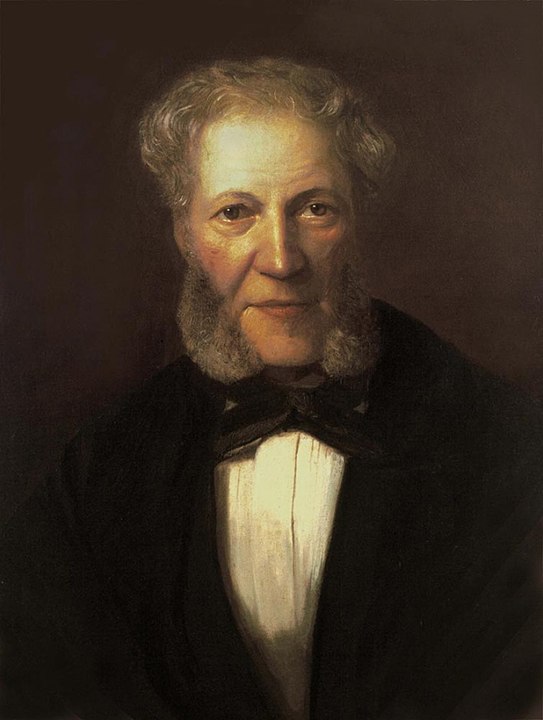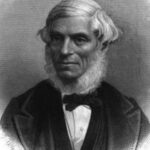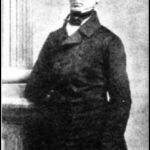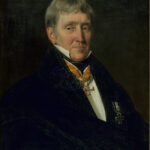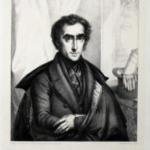They say you should never meet your hero in person. Ignaz Moscheles did and still remained a fan. How did it happen?
Who was Ignaz Moscheles?
Isaac Ignaz Moscheles (23 May 1794– 10 March 1870) was a composer and piano virtuoso from Bohemia. He was born in Prague into a German speaking Jewish family. His father was a merchant, who himself played the guitar, and was eager to have a child who is a musician.
Isaac moved to Vienna in 1808, where he changed his name to Ignaz. His talent made him a worthy pupil of Albrechtsberger and Salieri, masters from whom even Beethoven had learned previously. During the Congress of Vienna (1814-1815) he was one of the leading piano virtuosi in the city.
After his Viennese years he traveled Europe, became a celebrated pianist and finally settled in London for a longer period. Here he was awarded an honorary membership of the Royal Academy of Music. Moscheles felt home in England, but when his friend Mendelssohn had established the Conservatory in Leipzig, he moved there and became the member of the faculty, teaching piano for decades.
Moscheles was a practicing Jew during his years in Vienna. Later in London he and his family joined the Church of England, in 1832 all the family was baptized. Despite this move he never forgot his roots and remained close to Jewish communities. In Leipzig he was a leading figure to fight back on racist composer R.W. and his published hostile thesis.
As a composer he mainly focused on music with a piano, his opus numbers reached 142.
Moscheles died in Leipzig on 10 March 1870.
Beethoven and Moscheles
Moscheles idolized Beethoven. After moving to Vienna in 1809 he dreamed of meeting him personally, he wrote “…above all, I longed to see and become acquainted with that man who had exercised so powerful an influence over my whole being; whom, though I scarcely understood, I blindly worshiped.”
Meeting Beethoven was not easy, he was not very talkative and seldom was happy for visitors. In 1810, however, the lucky day has finally arrived for Moscheles. One morning he was at the shop of Artaria (a publisher), when Beethoven entered the door and “without looking up, as though he wished to pass unnoticed, made his way direct for Artaria’s private office.” A bit later Artaria called Moscheles into his office and introduced them saying, “This is Beethoven!” and, to the composer, “This is the youth of whom I have just been speaking to you.”
The idol was not chatty, only gave a friendly nod and said “he had just heard a favorable account” of him. Moscheles was disappointed, thinking “Am I then indeed such a nobody that he could not put one musical question to me? – nor express one wish to know who had been my master, or whether I had any acquaintance with his works? My only satisfactory mode of explaining the matter and comforting myself for this omission was in Beethoven’s tendency to deafness, for I had seen Artaria speaking close to his ear.”
For years Moscheles had to be satisfied with Beethoven’s music and not his friendship. He attended all possible concerts and grabbed all opportunities to get close to his idol. In 1814 his time has finally come! Artaria planned to publish a piano arrangement of Beethoven’s Fidelio and they proposed Moscheles for the job. Beethoven agreed with the condition that before publish, each manuscript must be approved by him personally.
Moscheles was over the moon and this condition was the best possible outcome for him, as this way he had reason and chance to meet the Master, and learn from his corrections. In the coming period he was balancing between finding all possible excuses to meet, but on the other hand not going too far and robbing him of his time. During these occasions Moscheles confessed that he was “treated with the kindest indulgence”, but Beethoven was very laconic in conversations, especially about his own music. Moscheles was convinced that “the impatience naturally accompanying his infirmity of deafness, no doubt greatly increased his constitutional reserve in the latter part of his life.”
Despite Beethoven’s withdrawn lifestyle, Moscheles gives account how often the Master accepted the invitation of “Vienna society ladies…to their musical performances and play him his compositions…”.
When the arrangement was finished, Moscheles wrote under the last section, “Fine mit Gottes Hülfe” (The end with the help of God). When the manuscript was returned he discovered an addition by Beethoven, “O, Mensch, hilf dir selber!” (Oh, man, help thyself!).
Even later years Moscheles never ceased to love and promote Beethoven. In London he was the conductor at the premiere of Beethoven’s Missa Solemnis and he himself translated Schindler’s Beethoven biography to English. In 1827 he persuaded the Royal Philharmonic Society to send funds to the dying Beethoven, who in return promised them a Tenth Symphony (something he started working on, but never finished).
Finally, a very telling story about Beethoven, who down to his hearing difficulties and later deafness, was reserved and withdrawn in the second part of his life, but had a very generous heart. Moscheles remembered this kind little story about how his brother wished to meet Beethoven and how it finally came to be:
“During one of my visits to Vienna, my brother, who is a resident of Prague, made a journey expressly to see me; and one morning, finding I had an appointment with Beethoven, was exceedingly anxious to get a sight of a man of such celebrity, whom he had never yet had an opportunity of seeing. It was very natural that I should wish to gratify his curiosity, but I told him, that although he was my own brother, yet I knew the peculiarities of the man so well, that nothing could induce me to commit the indiscretion of an introduction. He was, however, too intent upon his wish to let the opportunity escape without a further endeavor, and said that, surely, I might allow him to call, as if in furtherance of another appointment which we had mutually made. To this I consented, and off we went to Beethoven’s, where I left my brother in the passage below to wait the issue of our arrangement. I remained with Beethoven about half an hour, when taking out my watch and looking at it, I hastily wrote in his conversation-book that I had a particular appointment at that hour, and that I apprehended my brother was still waiting below to accompany me.
Beethoven, who was sitting at the table in his shirt-sleeves, instantly started from his seat, and quitting the room with precipitation, left me in no little embarrassment, wondering what was to follow. In a minute afterwards back he came, dragging in my brother by the arm, and in a hurried manner forced him into a seat. “And is it possible,” said he, “that you, too, could think me such a bear as not to receive your brother with kindness?” My brother, who had before received some vague insinuations that the renowned composer was not at all times in his sober senses, looked as pale as ashes, and only began to regain his self-possession on hearing the question which Beethoven so kindly, yet so reproachfully, asked me; for it appeared that the latter had rushed precipitately down the stairs, and, without saying a word, seized my brother by the arm and dragged him up-stairs as if he had caught hold of a criminal.
No sooner was my brother fairly seated than he behaved in the most kind and obliging manner towards him, pressing him to take wine and other refreshments.
This simple but abrupt act clearly shows, that however strange his manners were, he had at heart that kindly and good feeling which ever accompanies genius. If we were to take the external manner for the internal man, what egregious mistakes should we often make!”
